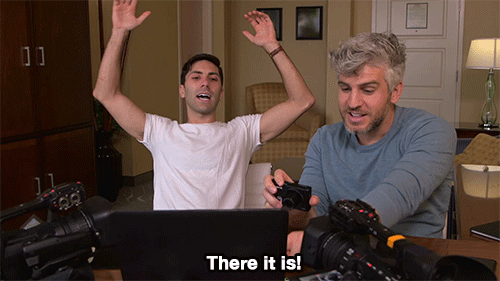Can you build a writing career on a professional pseudonym? Yes. But is it a good idea?
It's a question I hear a lot (and see a lot online). Should I use a pen name for my writing career, or my real name?
Everyone has their reasons for wanting to use a pseudonym.
Some writers may want to conceal a side gig from their primary employer. Others may wish to write in less-mainstream niches (i.e. cannabis, adult fiction) without risking reputational damage.
Maybe you just think a pen name is kind of sexy. "I'm a writer, after all..." you say as you tighten your ascot.

Should you use a pen name?
While the appeal of a pen name is understandable, it doesn't really confer any sort of career benefit to use one. In fact, there might be a number of downsides you should consider as you make your decision. Still, whether or not you should use a pen name is ultimately dependent on your broader life and career goals.
As you've gathered by now, there isn't really a straightforward answer to this one.
So let's take a look at this question from a few different angles.
Why you should use a pen name
Maybe you're thinking, "what's the harm?" Most writers work remotely and turn in their work via email, Dropbox, or publish it on Wordpress or in a client's CMS. What's the harm in a little extra anonymity?
Preserving some sense of anonymity is probably the best reason to use a pen name. Like we mentioned in the intro, there are practical reasons to want to remain anonymous as a freelance writer, or to be known under a different name altogether.
If you have a normie day job, there are a number of hypothetical scenarios wherein you might not want your boss discovering that you moonlight as a writer.
Maybe your employer has a policy against additional employment. Whether it's enforceable or not is another matter. But I once knew a writer once who got in trouble at a daytime marketing job for writing listicles about superhero movies on the side.
(It was me).
Maybe you write about controversial political topics, or in a less mainstream industry like the examples listed in the intro. This kind of content could reflect poorly on your employer and result in trouble for you.
We'd never advocate anyone get in that kind of trouble. Even if you hate your day job, it's a lot smarter to keep your head down until you can build up to full time as a freelance writer (assuming that's what you want).
So in this context, writing under a pseudonym might make sense.
I've also known writers who want to keep their SEO "uncluttered." Let's say you have some kind of job that requires some level of a public persona, like an insurance salesman or a lawyer.
The same way you wouldn't want potential clients seeing your Cheap Trick tribute band first when they Google your name, maybe you also don't want your number #1 Google Search result to be a listicle about Zack Snyder's Justice League that happened to rank.
It's also possible you have an extremely common name, or share a name with a celebrity. If you're "Michael Jordan", then you'll probably have a hard time outranking the other Michael in anything you ever do. (I believe in you, but it's Michael Jordan...)

God among plebes.
So far we've got a handful of pretty persuasive reasons to write using a pen name:
- Avoid hassle with an employer
- Work in less-mainstream niches
- Keep SEO around your name "clean"
- Avoid confusion with a common/celebrity name
Now let's look at the potential drawbacks.
Why you shouldn't use a pen name
The first and most important downside is this: a pen name might limit your ability to get jobs.
After being a freelance writer, I started my own content agency where I instantly found myself on the other side of the freelance table — I was the employer.
The stuff I learned from that side of the table was extremely illuminating, and a big part of the reason I started ProWriter with Dave.
Here's how this connects to the point.
A big thing about hiring writers is that no matter what kind of job you post, and no matter where you post it, you get flooded with applications.
In fact, most of the applications you get aren't even qualified candidates. They're just writers crawling jobs boards sending a pitch to every post hoping for a bite.
If you take those away, there are about a third left that actually have some experience or interest in your niche.
The problem we'd run into, though, is that we would often hire writers that sent us good samples only to find out that they... probably weren't the original authors of the samples they pitched us with, if you catch my drift.

We were catfished, I'm saying.
So to solve this problem, we started doing a deeper dive on the applicants who seemed qualified from their pitch samples.
This meant searching the web for other digital "footprints," like a social media presence, and bylines at credible sites (it's one of the reasons we built the ProWriter Portfolio — to bring all of these footprints together, making it easier for employers to vet candidates).
You might be seeing the problem for pen name writers here, but let me spell it out.
If you choose to use a pen name, you might run into trouble getting hired unless you spend some time creating digital "footprints" for your alter ego. This means that you'll probably need a couple of social profiles, a separate email, website, (a ProWriter portfolio!), i.e., a whole 'nother digital life to maintain.
I've talked before about the power of using a real picture of yourself in the signature line of your email pitches, and prominently across your digital spread. The same applies here.
And using your real photo with a pen name... kind of defeats the purpose.
Game it out
But let's say you're committed to the pen name idea, comfortable operating a second digital life with your same face all over it, figured out whatever tax and business implications using a pseudonym might require, etc.
What happens if you want to change your mind?
Let's say you transition out of your day job and into freelancing full time. You start building a name for yourself, make appearances on podcasts, guest column at major websites, etc. You're really taking off!
By then it's too late to change.
It's not like you can change the byline on every article you ever wrote. You've already built brand credibility with this pen name. That means you're stuck with it. Every new article you write under that name makes it that much more difficult to change your mind later.
Even if you're not destined to ultimately become a roundtable guest on a cable news program under that pen name, what if you simply change your mind and start applying for jobs under your real name?
If you're sending employers like me samples of your work with someone else's name on them, that's going to put up a red flag.
Lastly, there's something to be said about owning your work. There's honesty and integrity in it. If you're in for a pep talk along these lines, Todd Brisson has an excellent essay on it here.
All in all, this makes a pen name a little more trouble than it's worth. It complicates things unnecessarily.
What if you still really, really need to use a pen name?
Finally, let's say you're one of those who want to get close to the third rail and write on really controversial topics. Stuff you might have doubts about publishing under your real name.
Hear me loud and clear: A pseudonym will not protect you.
I know, I know. We did say that anonymity was probably the best reason to use a pen name. But that privacy is not ironclad.
If you build a name for yourself on controversy, you're entering an environment where other influence-seekers online are incentivized to kneecap you. Doxxing is a threat you have to contend with. Whether right or wrong, it's reality.
Personally, I don't think anyone should say anything publicly they wouldn't put their real name to.
But I realize that's old school. And I'm not saying there aren't legitimate reasons for anonymity.
I'm saying a pseudonym is not some privacy silver bullet.
I don't know if it's even possible to privacy-proof your life such that you could never be found out.
Recognize the risk that comes with dabbling in controversy. If people want to find out who you are, in this day and age, they will.
Our advice?
You've probably picked it up, but our bias definitely leans toward "don't use a pen name."
Still, there are credible reasons for wanting to use one. For those of you who are still leaning toward it, we hope we gave you a good rundown of the risks and considerations you should take into account.
Our last piece of advice is simply this: Commit to the bit.
If you choose to write under a pseudonym, then yes, you should put some work into creating a digital presence that you plan on sustaining throughout the course of your career.
I know of some writers who use multiple pseudonyms in different niches. That seems to be making things harder than they have to be, but it works for them, so no judgments there.
Make sure you think carefully about how using a pen name isn't tight-seal privacy protection in the digital age, and that it can impact some employment opportunities if you're trying to pitch samples that appear to have been written by someone else.
Editor Robert Lee Brewer even suggests pitching and communicating under your pseudonym for the duration of a relationship with an employer (up to the point where they have to actually pay you).
He says that it prevents the editor from accidentally bylining your real name, and avoids other points of potential confusion. It's good advice.
Takeaways and resources
Reminder that ProWriter offers a free, professional writer portfolio, which we referenced several times in this article. You can claim yours and start building it out in minutes here.
Finally, as always, find me on LinkedIn if you have any questions or feedback.
